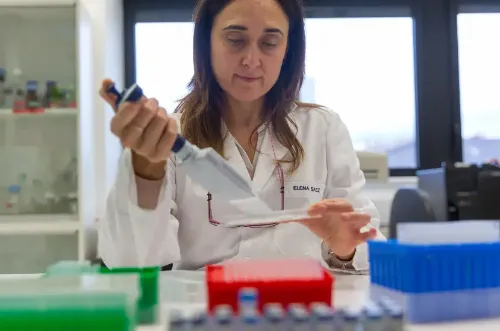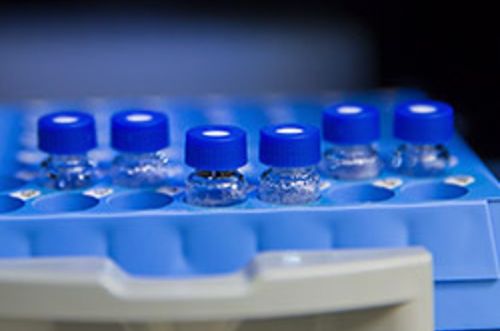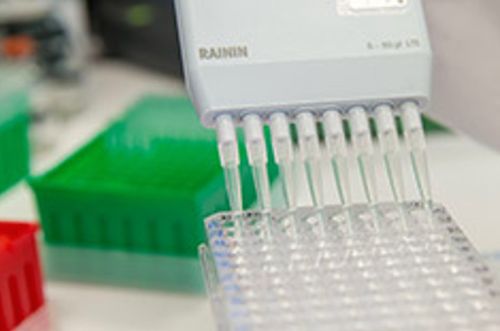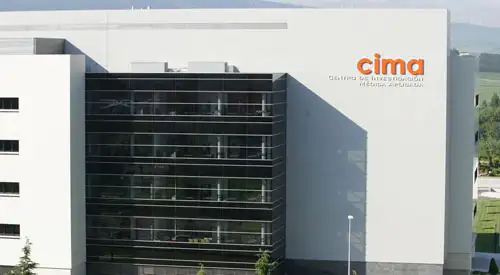Aptamers
"One of the most novel applications is the use of aptamers to deliver in vivo a cargo (siRNA or even another aptamer) to a target cell."
DR. FERNANDO PASTOR RODRÍGUEZ RESEARCHER. APTAMERS RESEARCH GROUP
Aptamers are single-stranded RNA or DNA molecules capable of folding into complex secondary and tertiary structures. They have affinities and specificities comparable to or superior to those of monoclonal antibodies and can be used in both therapeutic and diagnostic applications, including delivery systems for small molecules or gene payloads such as RNAi.
The Aptamer Group at CIMA, University of Navarra, part of the Cancer Center Clínica Universidad de Navarra and led by Fernando Pastor, focuses its research on the generation of aptamers with different therapeutic applications, devoting much of its development to immunotherapy, with the aim of inducing and enhancing the anti-tumor immune response.
The group has developed antagonist and agonist aptamers targeting multiple immune receptors, including CD3, TIM3, LAG3, ICOS, CD28, and CD40, modulating their function according to therapeutic requirements. In addition, it works on the design of “riboswitches” or RNA gene switches, which allow the expression of a transgene to be controlled by inducers capable of changing the conformation of the gene switch. It also develops intracellular aptamers, capable of delivering therapeutic payloads within target cells, ranging from siRNA to other aptamers.
The group has extensive experience in aptamer selection methods, both in vitro and in vivo, applying classic SELEX strategies, targeted selection in cells, and in vivo selection in experimental models, combining bioinformatic analysis tools to prioritize the best aptamers. These methodologies allow the identification of molecules with high affinity and specificity, optimizing their functionality and therapeutic potential.
Within its lines of research in immunotherapy, the group has a special interest in elucidating how the nonsense-mediated mRNA decay (NMD) pathway acts as a critical regulator of tumor antigenicity. As part of this research, RNAi-conjugated aptamers are being developed to selectively inhibit the NMD pathway, increasing the visibility of tumors to the immune system and enhancing the antitumor response.

Dr. Fernando Pastor
GROUP LEADER
| +34 948 194 700 | |
| fpasrodri@unav.es | |
| Research profile |
Oncology research integrated in the
Cancer Center Clinica Universidad de Navarra

Objectives of our research
Real alternative to monoclonal antibodies in biomedical, diagnostic and therapeutic research.
Development of therapeutic agents with high affinity and specificity for various diseases.
Clinical trials to validate the use of aptamers to enhance the immune response against tumors.
Design and synthesis of aptamers
They are selected using the SELEX (Systematic Evolution of Ligands by Exponential Enrichment) technique, a complex technique consisting of multiple binding, partitioning and elution steps.
This whole process is carried out in the laboratories of the Cima Universidad de Navarra.
NEW THERAPEUTIC TARGETS
Therapeutic innovation
To discover new molecular therapies that may address unmet medical needs.

In-vitro and in-vivo validation
In order to know the efficacy and safety of new targets or mechanisms of action of clinical interest through the use of new molecules.

Development of therapeutic agents
Design of new molecules for multifactorial optmization to reach the patient as quickly as possible.

External collaboration
with companies
We make it possible for external companies, with capacity and resources, to invest in the project and take it to the patient, which is our main objective.

Would you like to help us?
Thanks to the generosity of many people, the Cima Universidad de Navarra is a reality that strives to offer therapeutic solutions to achieve personalized medicine for patients.
Meet the research team







Scientific activity of the Aptamer Research Group
Latest scientific publications
- Dual ENPP1/ATM depletion blunts DNA damage repair boosting radioimmune efficacy to abrogate triple-negative breast cancer Aug 13, 2025 | Magazine: Signal Transduction and Targeted Therapy
- CD3 aptamers promote expansion and persistence of tumor-reactive T cells for adoptive T cell therapy in cancer Apr 23, 2024 | Magazine: Molecular Therapy Nucleic Acids
- Modulating T Cell Responses by Targeting CD3 Feb 13, 2024 | Magazine: Cancers
- Engineering U1-Based Tetracycline-Inducible Riboswitches to Control Gene Expression in Mammals Dec 12, 2023 | Magazine: ACS Publications
